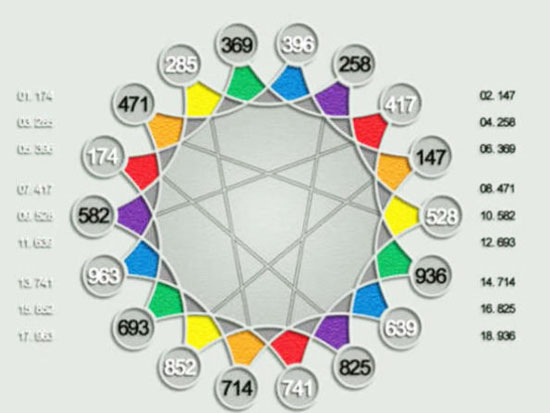The Hidden Insidious Effects of Trapped Negative Emotions (2)
Read the first part of the article
Sound Therapy

This method has many variations but what they all have in common is the use of sound to affect the energy in your body. One example of this is the use of a series of six musical tones called the solfeggio frequencies that are said to increasingly raise your vibration when listened to. These tones help dissolve or transmute negative energy such as trapped emotions which effectively releases them from your body and energy system.
This method is a totally passive external method that does not require you to identify your trapped emotions, or the experiences that caused them. You can read more about the healing power of the solfeggio frequencies and find links to the tones in this article.
Third Party Removal
There are a number of energy healers that act as facilitators or intermediaries for non-physical beings who provide the service of removing or dissolving our trapped negative emotional energy. The exact methods used by the various practitioners vary but they all claim to be able to remove your trapped emotions and provide immediate long-lasting relief from their adverse effects.
This is a completely passive external method. It does not require you to identify your trapped emotions, or understand what experience was involved in creating them, or transform yourself in any way. It simply requires you to want to clear yourself of negative energy and be willing to allow healing to occur.
The Emotion Code Method
The Emotion Code method was developed by Dr. Bradley Nelson and it uses muscle testing to quickly and accurately identify what trapped emotions a person has and what experience created them.
Muscle testing is a procedure that accesses the subconscious to get yes or no and true or false answers to specific questions regarding what trapped emotions we have and their cause. Apparently, the spirit realms have provided us this query tool to facilitate clearing our negative trapped emotions which is essential if we are to awaken and ascend according to God’s plan because trapped negative emotions are one of the key things that are stopping us from achieving this.
Once one has identified a trapped emotion they then state their intention to release the emotion and swipe a magnet (which produces an electromagnetic energy field) over the governing energy meridian of their body to amplify their intention and to release the emotion.
The Emotion Code method is a hybrid method that lies somewhere between passive external and active internal, even though the direct method is fairly passive and external in and of itself. Dr. Nelson, in his book The Emotion Code does address the changes of attitude and perspective that can greatly help in releasing old emotional wounds and avoid creating new ones.
Overall, this is a method that anyone can learn and administer to oneself or one’s friends and family. Dr. Nelson provides a thorough explanation of the whole topic and teaches the methodology in his book The Emotion Code.
Other Methods
There are a bunch of other methods that claim to release trapped emotions that may or may not be effective. Here are a few of them: The Sedona Method, Access Bars, and Emotional Freedom Technique (EFT / Tapping). There are certainly others as well.
Shortcomings of These Methods
The problem with many of these methods is that even though they can clear your accumulated trapped negative emotions and the undesirable manifestations they cause from your life they do not ensure that you won’t trap more emotions in the future. And this is because they do not require you to transform yourself and therefore the way you interpret and respond to life’s traumatic experiences.
No Longer Creating Trapped Emotions
So how do you ensure you don’t trap more negative emotions in the future? By understanding how your current state of being is contributing to how you interpret and respond to challenging situations and learning a new way of being that responds differently. After all it is how you interpreted and responded to your past experiences that made them “traumatic” and “emotionally charged” and caused you to trap negative emotions in the first place.
The Greek Stoic philosopher, Epictetus, said about the importance of how you respond to life’s challenges: “It’s not what happens to you, but how you react to it that matters”.
Here are several transformations you can make to yourself that can change how you interpret and respond to life’s challenging situations. Making these transformations will not only improve how you feel as these situations are occurring, but will also greatly reduce the chances of trapping emotions.
Here they are:
• Learn to deliberately choose your emotions rather than being emotionally reactive.
• Allow yourself to fully feel whatever emotions arise without judgment.
• Become more forgiving and less judgmental.
• Take full responsibility for everything you experience.
• Look for the pearl of wisdom in every situation and learn the lesson rather than blaming.
Let’s explore each of these in more depth.
Reducing Your Emotional Reactivity
One of the things that contributes to the creation of trapped negative emotions is your level of emotional reactivity. Emotional reactivity is when you unconsciously react to situations with strong negative emotions. It’s when you let circumstances dictate how you feel and respond rather than deliberately choosing how you want to feel and respond. It’s your knee-jerk reactions that you have to life’s happenings.
One thing that can help you transcend reactivity is being aware that you, and only you, choose your emotions.
You Choose Your Emotions

Many people believe that their emotions are caused by what someone else is doing or the situation they find themselves in. You’ve seen this belief in action if you’ve heard people saying things like “This person makes me so mad…” or “That made me so depressed…” or “That put me in such a bad mood”.
Of course, this is kind of ridiculous because no one but you chooses how to interpret and respond to situations – no one can make you feel any emotion that you don’t choose to feel. Things that happen to you do not determine the emotions that you feel. Although you may not have deliberately chosen every circumstance you find yourself in, you do have the ability to choose how you think, feel, and act. No matter what happens, you ultimately are responsible for how you respond.
Many of us unwittingly fall victim to our emotions at times. Our knee-jerk emotional reactions can happen so fast that it seems like there isn’t any time to choose differently. If you are late for an appointment, you may automatically feel anxious. If someone treats you rudely, you might automatically feel offended. When you are insulted or abused, you may immediately feel resentful or angry in response.
All of us experience disturbing situations occasionally but unless you take responsibility for how you respond, you will simply react. When you allow yourself to react, your subconscious mind and your ego often will deliver negative emotion, likely ones used in similar circumstances in the past. This is because you are allowing the situation to trigger your automatic response patterns, but you don’t have to. You can override them and deliberately choose how to respond. In every new situation you encounter you can choose to feel and respond differently than you have in the past.
You always are choosing your emotions; it is just that you are either doing it unconsciously or consciously. Simply becoming aware of this can greatly facilitate you becoming less emotionally reactive. Of course, setting an intention to become more deliberate about how you respond to life’s bumps can help greatly also. It’s not always easy but you can get better at it with intent and practice.
So here’s a practical suggestion on how to avoid simply reacting unconsciously the next time you are faced with a challenging situation. When you feel that surge of negative emotions starting to build (and with practice noticing this will become easier) take a short pause and breathe. This gives yourself the space to connect with your higher-self and remember who you really are or want to be and to consider what response will be the most productive, loving, and compassionate. And only then answer in a deliberate fashion based on that.
Of course, one of the keys to consistently choosing to feel and respond differently is to fundamentally transform how you interpret situations. And the key to this is to adopt new beliefs and attitudes about people and situations; for example, adopting a more understanding, forgiving, less judgmental attitude, taking more responsibility for your experiences (rather than the tendency to blame others), and focusing on the pearl of wisdom that these situations almost always contain, rather than focusing on the problem itself. We’ll explore all of these in some detail shortly, but first let’s take a look at how to handle the emotions that do arise, so you can reduce the chances that you will repress them and trap them.
Allowing Yourself to Feel the Emotions Fully
Regardless of what emotions do arise, you must not judge those emotions or yourself for having them. Doing this is part of the reason that you suppress and trap them.
To ensure that you don’t trap them, you must allow yourself to feel those emotions fully – without judgment. There’s nothing wrong with how you feel, they are just feelings. Let them flow through you and feel them completely. Really let yourself vent – jump up and down, scream, cry, or whatever you need to do and just keep doing it until the feeling dissipates.
You might want to remove yourself from the situation before you do this but let yourself do this. Very important: don’t judge what you are feeling or yourself for feeling that way – this will only encourage you to suppress those emotions, which is what we are trying to avoid.
The goal is to feel your feelings fully and then let them go. If you hold a grudge or can’t stop thinking about a situation it’s probably because you haven’t released the emotional charge that you allowed that situation to create within you.
Read the third part of the article
yogaesoteric
December 12, 2018
